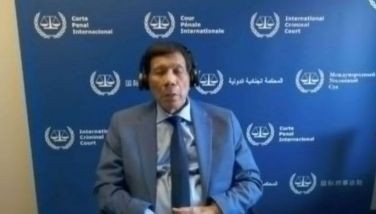Climate change worse than COVID-19

The continuing surge of COVID-19 cases is alarming. Latest world figures from Worldometer show 55,928,371 coronavirus cases; 1,342,840 have died; 38,929,811 have recovered and 15,655,719 people are currently infected. In the United States, by far there have been 11,693,789 cases, 7,077,846 have recovered, but 254,251 have died. In the Philippines, there have been 410,718 cases; 374,543 have recovered and 7,862 have died.
But climate change is a bigger threat than COVID-19.
This we learned after reading the International Federation of Red Cross and Red Crescent societies (IFRC) report that global warming “poses a greater threat than COVID-19.”
The alarming figures, the tumbling down of economies and livelihoods, the grieving of people over the loss of loved ones, the fear and anxiety about being infected and the uncertainty over the discovery of the vaccine to prevent infection by the coronavirus seem to be playing second fiddle to a greater calamity – climate change.
“Even as the pandemic rages, climate change is not taking a break from wreaking havoc,” says the IFRC report. It says that on global catastrophes since the 1960s, the world has been hit by more than 100 disasters, many of which are climate-related.
More than 50 million people have been affected by the pandemic, and claimed more than one million lives, says IFRC Secretary General Jagan Chapagain in the report.
But, Chapagain says, IFRC expects “climate change will have a more significant medium- and long-term impact on the human life and on earth.”
While it looks increasingly likely that one or several vaccines would soon become available against COVID-19, Chapagain stresses that “unfortunately there is no vaccine for climate change.” When it comes to global warming, “it will require a much more sustained action and investment to really protect the human life on this earth.”
The frequency and intensity of extreme weather and climate-related events have already increased considerably in recent decades, the IFRC says. In 2019 alone, the world was hit by 308 natural disasters, 77 percent of which were climate or weather-related, killing some 24,400 people.
The number of climate and weather-related disasters has been steadily climbing since the 1960s, and has surged by nearly 35 percent since the 1990s, says the IFRC report. Disasters of this kind have killed more than 410,000 people over the past decade, most of them in poorer countries, with heat waves and storms proving the most deadly.
* * *
In a separate report, the National Aeronautics Space Administration (NASA) said that the potential future effects of global climate change include more frequent wildfires, longer period of drought in some regions and an increase in the number of such incidents.
The Philippines, according to Worldometer, ranks No. 2 among countries most affected by climate change, with Japan as No. 1, Germany and Madagascar as No. 3 and 4.
NASA’s report cites the impact of climate change as due to ongoing effects including rising sea levels due to thermal expansion and melting of glaciers and ice sheets and warming of the ocean surface, leading to increased temperature stratification. Other possible effects include large-scale changes in ocean circulation.
* * *
The late senator Heherson Alvarez, who had convinced president Corazon Aquino to declare April 22, 1990 as Earth Day (this was followed by president Gloria Macapagal-Arroyo with another declaration), said that 194 countries had begun celebrating Earth Day to save Mother Earth from the ultimate disaster – climate change – unless mankind can rescue and finally remove carbon dioxide (C02) and other greenhouse gases (GHGs) from the atmosphere.
The former secretary of energy and of the Climate Change Commission said the UN Intergovernmental Panel on Climate Change (IPCC) pointed out a concentration of 3,100 billion metric tons of GHGs in the atmosphere that brought about the overheating of the whole earth to an average 1.3 degree Celsius higher than before the Industrial Revolution. This overheating is melting the polar caps, the ancient glaciers of the Himalayas, causing the rising of the oceans and the severe and more frequent typhoons and storms, and great droughts.
“The global environment that we sought to enhance has deteriorated – much to the anguish of leaders – causing the suffering of populations across the world. Increasing carbon emissions, the result of uncontrolled use of coal and hydrocarbons, are creating climate impacts that are catastrophic.
“Prolonged drought and extreme temperatures are taking terrible tolls on food crops. In sections of Syria, Turkey, Iraq and Iran, severe drought has led to enormous crop failures and the loss of livestock. We have suffered intermittent droughts in Mindanao and the Cagayan Valley.
“Deforestation, removal of vegetation and exploitative agriculture had degraded lands, turning these into deserts. In China, the deserts have expanded by 21,000 square miles since 1975, crowding out cropland and producing devastating sandstorms. In our own country, this has led to typhoons and tropical storms that are becoming more intense, with higher loss to lives and properties.”
“Let us recognize that climate change is a threat multiplier,” Alvarez said on Earth Day 2017 – three years ago, though the warning continues to this day, after he passed on early this year. Climate change, he said, is “undermining the economic and political stability of nations. And ecological disasters are wreaking turmoil in many societies to the point where huge numbers of people are being displaced, becoming ‘environmental migrants’ or ‘climate refugees’.”
Alvarez called for people to keep their communities clean, to stop the pollution of our rivers and lakes, to grow trees or mangroves along our coastal areas and to teach our children to love and protect our environment.
“Unless we reduce CO2, the overheating of the earth will continue and if it reaches 2 degrees, mankind cannot stop this heating anymore. It could mean the gradual destruction of our life-support system and eventually, the human civilization.”
* * *
Email: dominitorrevillas@gmail.com
- Latest
- Trending






























